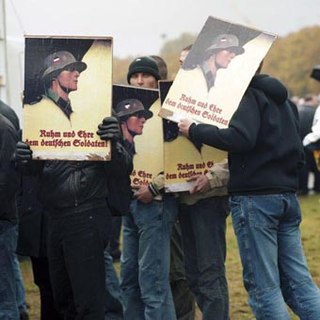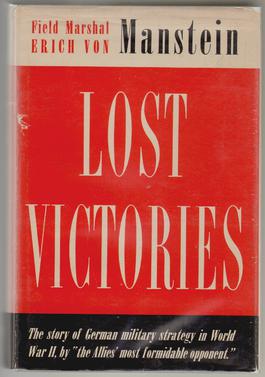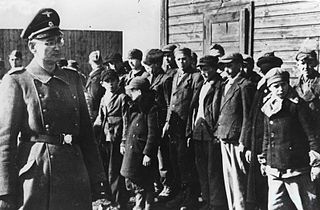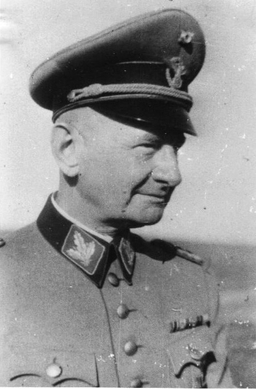Related Research Articles

The Commissar Order was an order issued by the German High Command (OKW) on 6 June 1941 before Operation Barbarossa. Its official name was Guidelines for the Treatment of Political Commissars. It instructed the Wehrmacht that any Soviet political commissar identified among captured troops be summarily executed as a purported enforcer of the so-called Judeo-Bolshevism ideology in military forces. It is one of a series of criminal orders issued by the Nazi leadership.

The Wehrmacht exhibition was a series of two exhibitions focusing on the war crimes of the Wehrmacht during World War II. The exhibitions were instrumental in furthering the understanding of the myth of the clean Wehrmacht in Germany. Both exhibitions were produced by the Hamburg Institute for Social Research; the first under the title "War of Annihilation. Crimes of the Wehrmacht 1941 to 1944", which opened in Hamburg on 5 March 1995 and travelled to 33 German and Austrian cities. It was the subject of a terrorist attack but the organizers nonetheless claimed it had been attended by 800,000 visitors. The second exhibition – which was first shown in Berlin in November 2001 – attempted to dissipate considerable controversy generated by the first exhibition according to the Institute.

Wolfgang Kraushaar is a political scientist and historian. After a residency at the Hamburger Institut für Sozialforschung from the 1980s until 2015. In 2015 he continued his research at the Hamburg Foundation for the Promotion of Science and Culture also in Hamburg, Germany.
Hans Christian Gerlach is professor of Modern History at the University of Bern. Gerlach is also Associate Editor of the Journal of Genocide Research and author of multiple books dealing with the Hunger Plan, the Holocaust, and genocide.

Fritz Freitag was a German SS commander during the Nazi era. During World War II, he commanded the 2nd SS Infantry Brigade, the SS Cavalry Division Florian Geyer, and the SS Division Galicia. Freitag committed suicide in May 1945.

Hans Georg Heer is a German historian, chiefly known for the Wehrmachtsausstellung in the 1990s. While controversial at that time, the exhibition is nowadays widely credited with opening the eyes of the German public to the war crimes of the Wehrmacht committed on the Eastern Front during World War II. Having been suspended in 1999 for review, the exhibit reopened in 2001 under the name "Crimes of the German Wehrmacht: Dimensions of a War of Annihilation 1941–1944". The exhibitions were instrumental in the debunking of the myth of the clean Wehrmacht in Germany.

Verlorene Siege is the personal narrative of Erich von Manstein, a German field marshal during World War II. The book was first published in West Germany in 1955, then in Spain in 1956. Its English translation was published in 1958 for distribution in the UK and the US.

Harald von Hirschfeld was a general in the Wehrmacht of Nazi Germany who commanded the 78. Volksgrenadier-Division during World War II. He was a recipient of the Knight's Cross of the Iron Cross with Oak Leaves.

Johann-Georg Richert was a German general during World War II. He commanded the 286th Security Division whose personnel committed numerous war crimes in occupied Belarus, in the Army Group Center Rear Area.

Heuaktion was a World War II operation in which 40,000 to 50,000 Polish children aged 10 to 14 were kidnapped by German occupation forces and transported to Nazi Germany as slave labourers.
The Hamburg Institute for Social Research is an independent private foundation whose scholarship is focused on both contemporary history and the social sciences. Founded in 1984 by Jan Philipp Reemtsma, it currently employs about 50 people with roughly 50% working in the research fields of sociology and history. The institute publishes a bimonthly journal called Mittelweg 36 and has its own publishing house.

Jan Philipp Fürchtegott Reemtsma is a German literary scholar, author, and patron who founded and was the long-term director of the Hamburg Institute for Social Research. Reemtsma lives and works mainly in Hamburg.
Walter Braemer was a general in the Reichswehr and the Wehrmacht and a high-ranking SS commander during the Nazi era. He was a Nazi criminal responsible for mass murders of the civilian population of Bromberg/Bydgoszcz in Poland at the outset of the Second World War, and later for crimes against humanity in the Holocaust in the Soviet Union. He escaped prosecution and punishment after the war despite having been held for 2+1⁄2 years as a prisoner of war by the British.

Mountains on Fire is a 1931 German war film directed by Karl Hartl and Luis Trenker and starring Trenker, Lissy Arna and Luigi Serventi. The film was based on Luis Trenker's novel of the same title, partly based on his own experiences. Separate French and English-language productions were also made.

The myth of the clean Wehrmacht is the negationist notion that the regular German armed forces were not involved in the Holocaust or other war crimes during World War II. The myth, heavily promoted by German authors and military personnel after World War II, completely denies the culpability of the German military command in the planning and perpetration of war crimes. Even where the perpetration of war crimes and the waging of an extermination campaign, particularly in the Soviet Union – where the Nazis viewed the population as "sub-humans" ruled by "Jewish Bolshevik" conspirators – has been acknowledged, they are ascribed to the "Party soldiers corps", the Schutzstaffel (SS), but not the regular German military.
The 285th Security Division was a rear-security division in the Wehrmacht of Nazi Germany. The unit was deployed in German-occupied areas of the Soviet Union, in the Army Group North Rear Area.

In German military history, Bandenbekämpfung, also referred to as Nazi security warfare during World War II, refers to the concept and military doctrine of countering resistance or insurrection in the rear area during wartime with extreme brutality. The doctrine provided a rationale for disregarding the established laws of war and for targeting any number of groups, from armed guerrillas to civilians, as "bandits" or "members of gangs". As applied by the German Empire and later Nazi Germany, it became instrumental in the crimes against humanity committed by the two regimes, including the Herero and Nama genocide and the Holocaust.

The Minsk Trial was a war crimes trial held in front of a Soviet military tribunal in 1946 in Minsk, the capital of Soviet Belarus. Defendants included German military, police, and SS officials who were responsible for implementing the occupational policies in Belarus during the German–Soviet War of 1941–45.

Eberhard Herf was a German police official and war criminal during the Nazi era. He commanded Police Regiment North and Order Police units in Minsk, Belarus. Following the war, Herf was convicted in the Minsk Trial and executed.
A war of annihilation or war of extermination is a type of war in which the goal is the complete annihilation of a state, a people or an ethnic minority through genocide or through the destruction of their livelihood. The goal can be outward-directed or inward, against elements of one's own population. The goal is not like other types of warfare, the recognition of limited political goals, such as recognition of a legal status, control of disputed territory, or the total military defeat of an enemy state.
References
- Langenbacher, Eric (Spring 2002). "Competing Interpretations of the Past in Contemporary Germany". German Politics and Society . Berghahn Journals. 20 (1): 92–106. doi:10.3167/104503002782385507.
- Shepherd, Ben H. (April 2002). "War of Extermination. The German Military in World War II 1941-1944, edited by Hannes Heer and Klaus Naumann". German Politics. 11 (1): 202–204.
- Hasse, Edgar S. (April 11, 2010). "From Hitler's Wehrmacht to the Bundeswehr". Die Welt . Retrieved April 11, 2016.